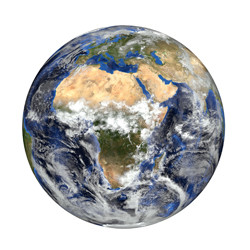Africa–Europe Earth Observation project
The 'Europe Africa Marine Network' (EAMNET) project built a network for coastal and marine observations to support sustainable development. The networked linked EO information providers, user networks and centres of excellence in Africa and Europe. EAMNET conducted capacity building and maintenance, and built upon existing infrastructure and expertise, enhancing bilateral research and job opportunities for African scientists. The initiative's overall aim was to improve exploitation of EO data for coastal and oceanic monitoring and develop an Africa-wide observation system. Access to near-real-time data had a number of scientific and environmental monitoring applications. These included the monitoring of harmful algal blooms, the coastal movement of sediments, and the location of eddies and upwelling, which are often preferential sites for fisheries. The data was also used in the development and updating of computer models. EAMNET also installed five operational GEONETCAST satellite-receiving stations in Benin, Côte d'Ivoire, Egypt, Mozambique and Uganda. In addition, access to satellite data was provided to research institutes, thereby enabling them to better manage marine areas (plus Lake Victoria in Uganda). The project also provided an interface between European Global Monitoring for Environment and Security (GMES)-related initiatives and African initiatives such as AMESD and MESA. Best practice was ensured through the exchange of personnel in Africa and Europe. A Masters-level module in EO was established at the Universities of Cape Town, Dar-es-Salaam and Ghana as well as other universities. Open access lesson materials were also developed for self-learning. In addition, a regular marine science presence was established at the African Association for Remote Sensing of the Environment (AARSE) conference. EAMNET's success will enable African scientists to easily access EO data at low cost. The resulting gain in expertise will support sustainable development in Africa by enabling marine EO data to be fully exploited.
Keywords
Earth Observation, marine, coastal, sustainable development, oceanic monitoring, environmental monitoring, satellite, marine science



